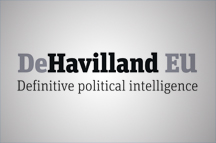This month, the Commission celebrates 50 years of EU pharmaceuticals law with a special conference to discuss future priorities for the industry. Together with Friday’s Horizon 2020 information day, covering 'Health, demographic change and wellbeing', European health policy falls once again under the spotlight.
As threats to our health become ever more globalised, DeHavilland EU has published a new white paper, examining the importance of responding to health challenges at the European level. Download the white paper online here.
Responding to shared healthcare challenges
 Europe's leaders first recognised the need for coordinated action when they introduced a European competence for health in the Maastricht Treaty in 1992, and the EU has encouraged Member States to further coordinate healthcare policy ever since. While pan-European healthcare policy may remain a distant prospect, efforts continue to be made to further develop an EU response to European health problems.
Europe's leaders first recognised the need for coordinated action when they introduced a European competence for health in the Maastricht Treaty in 1992, and the EU has encouraged Member States to further coordinate healthcare policy ever since. While pan-European healthcare policy may remain a distant prospect, efforts continue to be made to further develop an EU response to European health problems.
All European countries face similar demographic challenges related to aging populations, which has placed pressure on health systems. At the same time, the economic crisis has had several negative impacts on health and led to a squeeze on healthcare budgets, placing extra pressure on healthcare services already struggling to meet demands.
In recognition of these challenges, the EU has dedicated €449.4 million to achieve the goals set out in the Health Programme for 2014 to 2020. These goals include tackling the impacts of the economic crisis, emphasising cost-effective measures such as disease prevention and health promotion, addressing shortages of resources, and improving the sustainability of health systems.
Integrating European healthcare systems
To relive pressure on healthcare resources, the Cross-Border Healthcare Directive provides greater clarity on healthcare rules in each Member State with the aim of enabling increased patient mobility and the sharing of healthcare resources throughout the EU. A report recently released by the Commission on the implementation of the Directive is up for debate by Health Ministers next week.
While the Commission reported that take up of the Directive had been slow, and patient mobility limited for unplanned healthcare, it was optimistic that EU states would be able to make better use of their respective health resources in future thanks to the framework established by the legislation. For the Directive to be fully effective, Member States will need to work on increasing patient awareness of their national contact points, and their rights to reimbursement.
Innovating healthcare
A priority for the Juncker Commission has been the promotion of innovation and the Digital Single Market, and the health sector is no exception. With health systems facing pressure in terms of national budget cuts and the rise in chronic diseases, innovative means of reducing healthcare costs, such as eHealth could not have come at a better time.
The Commission hopes that by promoting eHealth through the Digital Single Market and improved interoperability it will not only reduce healthcare costs but also improve the quality and efficiency of healthcare.
Preventative action
Further action is also planned to encourage, or at least make it easier, for Europeans to lead healthier lifestyles. Alcohol, unhealthy diets, physical inactivity, and smoking have been closely linked to the rise in chronic diseases, which now account for the lion's share of all diseases in the EU. The Commission will continue to pressure Member States to increase their spending on preventative measures, which currently only amounts to an average of 3% of national healthcare budgets.
It will also take matters into its own hands, as was seen with the adoption of the Tobacco Products Directive last year, and adopt further Delegated and Implementing Acts to flesh out the detail of the Directive in order to reduce Europeans' consumption of tobacco products. In addition to this, nutritional labelling requirements will come into force at the end of next year with the aim of providing clearer information to consumers enabling them to make a more informed choice about their diet.
DeHavilland EU Open Content
For the latest news on these issues and other policies tackling Europe's healthcare challenges, sign up to receive our complimentary Open Content, from 18 - 28 September.
Author
Adam Bowering
EU Policy Analyst
DeHavilland EU
@DeHavillandEU












